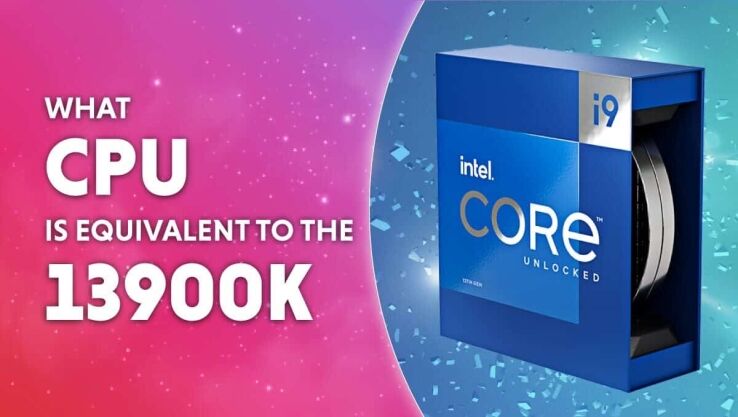What CPU is equivalent to the 13900K?
What CPU is equivalent to the 13900K? let's find out

WePC is reader-supported. When you buy through links on our site, we may earn an affiliate commission. Prices subject to change. Learn more
Intel’s new 13900K processor has been the talk of the town lately. It is currently the second fastest CPU in the world, second only to its special edition variant, the i9-13900Ks. Tim to find out what CPU is equivalent to the 13900K.
Now Read: Is the 13900K worth it?
Let’s examine the 13900K and determine which processors match its performance most closely.
Intel’s Core i9-13900K – processor specifications
The i9-13900K is a mighty processor. Here are some specs to give you a better idea of its capabilities.
- Cores: P-cores 8 / E-cores 16
- Threads: 32
- Base clock frequency: P.cores 3GHz / E.cores 2.2GHz
- Boost clock frequency: P.cores 5.8GHz / E.cores 4.3GHz
- L3 cache: 36MB
- Default TDP: 125 W / 253 W boost.
- iGPU: Intel UHD graphics 770
As you can see, the bar is set pretty high. Only the finest processors from Intel and AMD will have a chance at standing up to the 13900K.
What CPU is equivalent to the 13900K?
While no CPU offers exactly the same performance as the 13900K, we have several that come pretty close. As you may have anticipated, we have the Ryzen 9 7950X – the direct competitor to the 13900K.
The Ryzen 9 7950X
AMD Ryzen 9 7950X
Cores
16
Threads
32
Base Speed
4.5GHz
Boost Speed
5.7GHz
Cache
64MB
Socket
AM5
Intel’s Ryzen 9 7950X is their current flagship. It features a 16-core/32-thread setup. However, it has a 5.7GHz max clock, which is a 100MHz lower tower than the 13900K’s 5.8GHz boost.
100MHz isn’t a huge difference, but it’s enough to allow the 13900K to take the lead in single-thread performance.
The 13900K wins in multicore performance too. While 16 of its cores are efficiency cores, it has more cores overall. The 13900K has 24 physical cores, compared to the Ryzen 9 7950X.
You can find a more detailed comparison of the two here.
But, for now, it’s clear that the Ryzen 9 7950X is unable to match the 13900K’s performance. After consolidating various benchmarks, the 13900K appears to have a 5 to 10% edge over the 7950X. Not huge, but not negligible, either.
The Core i9-13900 and the Core i9-13900KS
With AMD unable to take down the 13900K, the only one left to do it is Intel itself. The 13900K has two other editions, the standard i9-13900, and the special edition i9-13900KS.
We compare the three processors in detail here.
But, to give you the short version, all three processors have pretty much identical specs – other than their boost clock, power usage, and price.
The standard 13900 has a boost clock of 5.6GHz, the K variant goes up to 5.8GHz, and the i9-13900KS leads at 6GHz. These are stock values.
Out of the three of these processors, the i9-13900K gives you the most bang for your buck. While it just loses out to the 13900KS in sheer performance, it’s over $100 cheaper, and it uses less power.
When compared to the i9-13900, the 13900K offers moderately more performance and support for overclocking while only costing some $40 more.
Final thoughts
The important thing to understand when comparing CPUs of this caliber is that you’ll almost never end up with a CPU bottleneck. So subtle differences in performance don’t amount to much in most cases.
The exception is productivity work, such as video editing and 3d rendering. These workloads do actually squeeze every last drop of performance out of a processor, so this is where differences in performance become visible.